- Home
- Shannon Hale
Books of Bayern Series Bundle
Books of Bayern Series Bundle Read online
BLOOMSBURY YA
Bloomsbury Publishing Inc., part of Bloomsbury Publishing Plc
1385 Broadway, New York, NY 10018
BLOOMSBURY and the Diana logo are trademarks of Bloomsbury Publishing Plc
Goose Girl first published in the United States of America in August 2003 by Bloomsbury Children’s Books
Enna Burning first published in the United States of America in September 2004 by Bloomsbury Children’s Books
River Secrets first published in the United States of America in September 2006 by Bloomsbury Children’s Books
Forest Born first published in the United States in September 2009 by Bloomsbury Children’s Books
This electronic edition published in January 2020 by Bloomsbury YA
Goose Girl copyright © 2003 by Shannon Hale
Enna Burning copyright © 2004 by Shannon Hale
River Secrets copyright © 2006 by Shannon Hale
Forest Born copyright © 2009 by Shannon Hale
All rights reserved. You may not copy, distribute, transmit, reproduce, or otherwise make available this publication (or any part of it) in any form, or by any means (including without limitation electronic, digital, optical, mechanical, photocopying, printing, recording, or otherwise), without the prior written permission of the publisher. Any person who does any unauthorized act in relation to this publication may be liable to criminal prosecution and civil claims for damages.
Bloomsbury books may be purchased for business or promotional use. For information on bulk purchases please contact Macmillan Corporate and Premium Sales Department at [email protected]
ISBN 978-1-5476-0628-3 (e-book bundle)
Library of Congress Catalog-in-Publishing Data
Goose Girl LCCN: 2002028336
Enna Burning LCCN: 2003065817
River Secrets LCCN: 2005035500
Forest Born LCCN: 2009000641
To find out more about our authors and their books please visit www.bloomsbury.com where you will find extracts, author interviews, and details of forthcoming events, and to be the first to hear about latest releases and special offers, sign up for our newsletters.
Contents
The Goose Girl
Part One: Crown Princess
Chapter 1
Chapter 2
Chapter 3
Chapter 4
Part Two: Goose Girl
Chapter 5
Chapter 6
Chapter 7
Chapter 8
Chapter 9
Chapter 10
Chapter 11
Chapter 12
Chapter 13
Chapter 14
Chapter 15
Chapter 16
Part Three: Yellow Lady
Chapter 17
Chapter 18
Chapter 19
Chapter 20
Chapter 21
Chapter 22
Enna Burning
Prologue
Part One: Sister
Chapter 1
Chapter 2
Chapter 3
Chapter 4
Chapter 5
Part Two: Warrior
Chapter 6
Chapter 7
Chapter 8
Chapter 9
Chapter 10
Chapter 11
Part Three: Prisoner
Chapter 12
Chapter 13
Chapter 14
Chapter 15
Chapter 16
Part Four: Friend
Chapter 17
Chapter 18
Chapter 19
Chapter 20
Chapter 21
River Secrets
Prologue
Chapter 1
Chapter 2
Chapter 3
Chapter 4
Chapter 5
Chapter 6
Chapter 7
Chapter 8
Chapter 9
Chapter 10
Chapter 11
Chapter 12
Chapter 13
Chapter 14
Chapter 15
Chapter 16
Chapter 17
Chapter 18
Chapter 19
Chapter 20
Chapter 21
Chapter 22
Chapter 23
Chapter 24
Chapter 25
Chapter 26
Chapter 27
Chapter 28
Chapter 29
Forest Born
Part One: The City
Chapter 1
Chapter 2
Chapter 3
Chapter 4
Chapter 5
Chapter 6
Chapter 7
Part Two: The Wood
Chapter 8
Chapter 9
Chapter 10
Chapter 11
Chapter 12
Chapter 13
Part Three: The Castle
Chapter 14
Chapter 15
Chapter 16
Chapter 17
Chapter 18
Chapter 19
Chapter 20
Chapter 21
Chapter 22
Chapter 23
Chapter 24
Chapter 25
Chapter 26
Chapter 27
Part Four: The Forest
Chapter 28
Chapter 29
Chapter 30
Copyright © 2003 by Shannon Hale
All rights reserved.
No part of this book may be reproduced or transmitted in any form or by any means, electronic or mechanical, including photocopying, recording, or by any information storage and retrieval system, without permission in writing from the publisher.
First published in the United States of America in August 2003
by Bloomsbury Children’s Books
Original paperback edition published in May 2005
New paperback edition published in July 2017
www.bloomsbury.com
Bloomsbury is a registered trademark of Bloomsbury Publishing Plc
For information about permission to reproduce selections from this book, write to Permissions, Bloomsbury Children’s Books, 1385 Broadway, New York, New York 10018
Bloomsbury books may be purchased for business or promotional use. For information on bulk purchases please contact Macmillan Corporate and Premium Sales Department at [email protected]
The Library of Congress has cataloged the hardcover edition as follows:
Hale, Shannon.
Goose girl / by Shannon Hale.
p. cm.
Summary: On her way to marry a prince she’s never met, Princess Anidori is betrayed by her guards and her lady-in-waiting and must become a goose girl to survive until she can reveal her true identity and reclaim the crown that is rightfully hers. ISBN-13: 978-1-58234-843-8 · ISBN-10: 1-58234-843-X (hardcover) [1. Fairy tales. 2. Princesses—Fiction. 3. Human-animal communication—Fiction.] I. Title.
PZ8.HI34 Go 2003 [Fic]—dc2I 2002028336
ISBN 978-1-68119-316-8 (new edition) • ISBN 978-1-59990-407-8 (e-book)
To find out more about our authors and books visit www.bloomsbury.com. Here you will find extracts, author interviews, details of forthcoming events and the option to sign up for our newsletters.
For Dean
Best Friend, Companion & Squeeter Keeper
You are Home
and
For Mom and Dad
Happy days to you
Love, Shannon
Contents
Part One: Crown Princess
Chapter 1
Chapter 2
Chapter 3
Chapter 4
Part Two: Goose Girl
Chapter 5
Chapter 6
Chapter 7
Chapter 8
Chapter 9
Chapter 10
Chapter 11
Chapter 12
Chapter 13
Chapter 14
Chapter 15
Chapter 16
Part Three: Yellow Lady
Chapter 17
Chapter 18
Chapter 19
Chapter 20
Chapter 21
Chapter 22
Part One
Crown Princess
Chapter 1
She was born Anidori-Kiladra Talianna Isilee, Crown Princess of Kildenree, and she did not open her eyes for three days.
The pacing queen directed ministers and physicians to the crib. They listened to her breathing and her hummingbird heart, felt her fierce grip and her tiny fingers soft as salamander skin. All was sound. But her eyes did not open.
For three days the grave-faced attendants came and went. They prodded her, lifted her lids, slipped thick yellow syrups down her throat.
“You are a princess,” the queen whispered to her ear. “Open your eyes.”
The baby cooed in her sleep.
When the third day had worn away to the lake blue of evening, a hand parted the nursery curtains. All was still for the night. The queen dozed on the bed. The baby in her crib dreamed of milk, her round, perfect lips nursing in sleep. A woman in a fern green robe pulled aside the curtains and tiptoed across the carpets. She slid her callused hands under the infant’s back and head, held her up, and grinned.
“Did you call me out of my house to come and tell you stories?” she said. “I will, my fat one, if you will listen.”
The queen awoke to the sounds of the rocking chair creaking and a voice singing about magpies and pigeons. She stood up, ready to call to the guards, then saw that it was her own sister who sang to the baby, and that the baby was looking back at her aunt with wide eyes.
It was the aunt who shortened the crown princess’s name to Ani.
On clear days she took Ani to the north edge of the palace grounds where no wall had been built. That far out, the garden was allowed to stray out of its ordered beds and rows and merge with the occasional copse of ash and pine. The aunt felt easier there, and she held her niece’s small hand and named all she saw.
“You see the bird on the tallest branch there, the one with a yellow breast? She’s migrating farther north now that the weather is warmer. The bluewing there is looking for twigs and says he has found himself a picky mate.”
Ani began to speak sentences at one year. The aunt knew too well how Kildenreans disliked anything outside the common, and she tried to keep Ani’s progress hidden. But the household staff noted it, and rumors began that perhaps the queer green-clad nurse-mary possessed unnatural methods of awakening a child’s words.
The queen was uncomfortable with the talk and careful never to call the new nurse-mary “sister.” But the king was too stubborn to worry much. “Why shouldn’t she be a quick learner? She is our daughter, of pure of blood as are ever born in this world, and has every right to speak before her time.”
But the king saw little of his firstborn, and the queen even less. Calib-Loncris was born, the first son, and then Napralina-Victery, who from birth so resembled her mother that the nurse-marys were inclined to curtsy to the crib. With the parents’ attention parted, the aunt became Ani’s constant companion.
In cold weather or spring rain, the aunt sat on the nursery floor and told Ani stories of fantastic and faraway things: a land where mares pawed gold nuggets from the earth and chewed them in order to breathe out music; a baker who baked birds from dough and sent them out the window in search of a treasured pot of apricot preserves; a mother who loved her baby so fiercely, she put him in a tight locket around her neck so that he might never grow up. The aunt sang songs again and again until Ani learned the words, her toddler’s voice as dry and delicate as a sparrow’s call.
A day in early summer when Ani was five, the two companions sat in an aspen’s dappled shade on the edge of the garden swan pond. Ani loved the birds that were as big as she and begged them to eat bread out of her hands. When the bread was all gone, they shrugged their wings and skronked at her.
“What did they say?”
“They wanted to know,” said the aunt, “was there more bread for the eating or should they go back to the pond.”
Ani looked at the nearest swan straight in one eye. “No more bread. You may go.”
The swan shrugged his wings again.
“What does that mean?”
“I don’t think he speaks your language, duckling.” The aunt turned her profile and one eye to the swan and made a sound like the swan spoke, not quite a honk and almost a whine. The swan padded back to the pond.
Ani watched with a solemn expression and after a moment repeated the sounds she had heard. “Was that right?”
“Perfect,” said the aunt. “Say that again.”
She repeated the noise and smiled. The aunt looked at her thoughtfully, the corners of her mouth tight with suppressed excitement.
“Does that make you happy?” asked the aunt.
“Yes,” said Ani with little-girl certainty.
The aunt nodded and took Ani into her lap to tell her a story about beginnings. Ani leaned her head against her aunt’s chest and listened to both the story and the sound of the story.
“The Creator spoke the first word, and all that lived on the earth awoke and stretched and opened their mouths and minds to say the word. Through many patterns of stars, they all spoke to one another, the wind to the hawk, the snail to the stone, the frog to the reeds. But after many turnings and many deaths, the languages were forgotten. Yet the sun still moves up and down, and the stars still shift in the sky, and as long as there are movement and harmony, there are words.”
Ani leaned her head back and, squinting, tried to look at the sun. She was young and had not yet learned that things like seeing the sun were impossible.
“Some people are born with the first word of a language resting on their tongue, though it may take some time before they can taste it. There are three kinds, three gifts. Did you know your mother has the first? The gift of people-speaking. Many rulers do. You see? And people listen to them, and believe them, and love them. I remember as children it was difficult to argue with your mother—her words confused me, and our parents always believed her over me. That can be the power of people-speaking.
“The first gift is the only reason this little land was not taken over by other kingdoms long ago. Rulers like your mother have talked themselves out of war for centuries. It can be powerful and good, and it can also be dangerous. I, unfortunately, wasn’t born knowing people-speaking.” The aunt laughed, and the surface of her eyes gleamed with memory.
“Do I have it, Aunt?”
“I don’t know,” she said. “Perhaps not. But there are other gifts. The second is the gift of animal-speaking. I’ve met a few who are able to learn animal languages, but like me, those people feel more comfortable near the mountains, among the trees and places where animals are not in cages. It’s not always a pleasant life, sparrow. Others are suspicious of those who can speak with wild things. Once there were many of us in Kildenree, I believe, but now, so few remember.
“The third is lost or rare. I’ve never known one with the gift of nature-speaking, though there are tales that insist it once was. I strain my ears and my eyes and my insides”—she tapped her temple lightly—“but I don’t know the tongue of fire or wind or tree. But someday, I think, someone will discover how to hear it again.”
The aunt sighed and smoothed her niece’s yellow hair. “Not many know the story of the three gifts, Ani. You must remember it. It’s important to know stories. I felt the earth shift to make a place for you when you were born, and I came to tell you stories while you are young. And like me, you were
born with a word on your tongue. I don’t know what word it was. You will grow older and discover it one day without my help.”
“Maybe fire or wind or tree?” said Ani.
“Maybe,” said the aunt. “I don’t know those tongues. I can’t help you discover them.”
Ani patted her aunt’s cheek as though she were the elder of the two. “But you can teach me to speak with the swans.”
They returned each day to the pond. When no gardener worked within sight or courtier walked near, Ani practiced the sounds she heard.
“They don’t have such a complicated world as we do and need so few words,” said the aunt. “Did you hear? The tall one there was greeting the one with the tail feathers missing. They are brothers. If they were sisters, the sound would go up at the end.”
Ani listened. “I just heard it. Like this.” She mimicked the greeting, drawing up the last sound slightly.
“Very good,” said the aunt. “You know, most people wouldn’t notice that. You can hear the tiny differences and imitate them—that’s your talent. But it takes work, too. You have to learn what it all means, like studying any foreign language. And it’s not just sounds. Watch how that one there bobs her head and moves her tail. And holds still. It all means something.”
On walks, the aunt called down the little birds from ash and beech perches, but they were anxious, busy things and would not stay long from their trees. Ani learned some of what the chickens in their coops and pigeons on their ledges complained and cooed to one another. They visited the small gray falcons and gold hawks when the hunt-master was out, and the wide-eyed owls in the barn rafters.
On one walk back from their wild garden, they passed the corrals. The warm, earthy smell drew Ani close, and she stood on a fence rail and watched the stable-master ride a graceful gray. She pointed.
“I want to speak to that one. The horse.”
“What a smart girl to think to ask.” She leaned behind Ani, her cheek pressed against her niece’s, and watched the animal run. “I have tried to speak to so many animals, Ani. The wild ones like wolves and deer will not stay still to listen or be listened to. Lizards, toads, rats, and all the little animals—I think perhaps their language is too simple for us bigger animals to understand. The domestic creatures like dogs, cows, and cats are sleepy in their comfort and used to communicating with people on our own terms. And birds, as you have seen, are perfect for speech. Always wild and yet always listening, and the larger ones especially, for they speak more slowly.

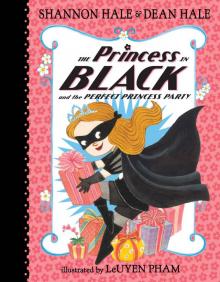 The Princess in Black and the Perfect Princess Party
The Princess in Black and the Perfect Princess Party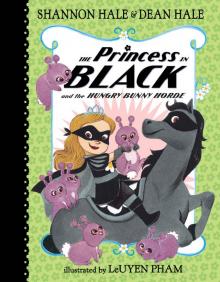 The Princess in Black and the Hungry Bunny Horde
The Princess in Black and the Hungry Bunny Horde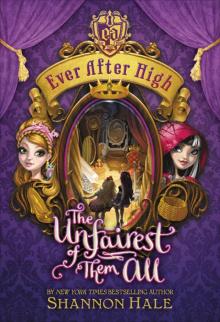 The Unfairest of Them All
The Unfairest of Them All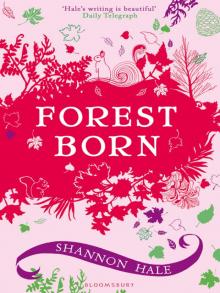 Forest Born
Forest Born 2 Fuzzy, 2 Furious
2 Fuzzy, 2 Furious The Actor and the Housewife
The Actor and the Housewife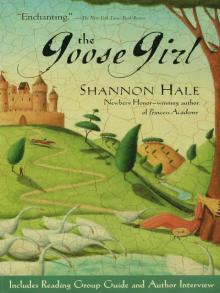 The Goose Girl
The Goose Girl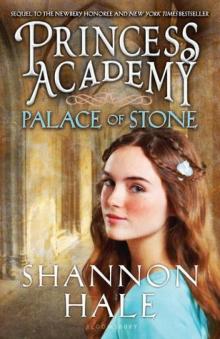 Palace of Stone
Palace of Stone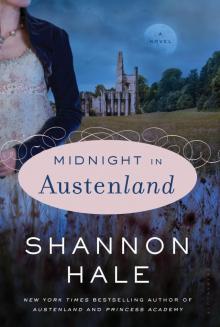 Midnight in Austenland
Midnight in Austenland Enna Burning
Enna Burning Dangerous
Dangerous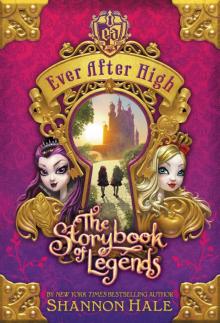 The Storybook of Legends
The Storybook of Legends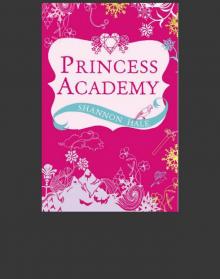 Princess Academy
Princess Academy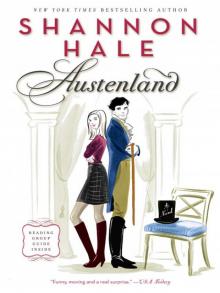 Austenland
Austenland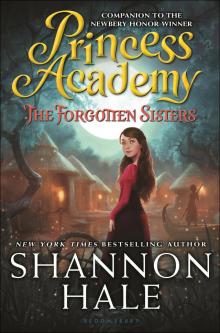 The Forgotten Sisters
The Forgotten Sisters The Unbeatable Squirrel Girl: Squirrel Meets World
The Unbeatable Squirrel Girl: Squirrel Meets World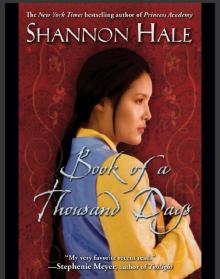 Book of a Thousand Days
Book of a Thousand Days Fire and Ice
Fire and Ice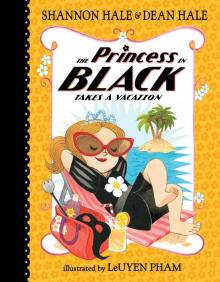 The Princess in Black Takes a Vacation
The Princess in Black Takes a Vacation River Secrets
River Secrets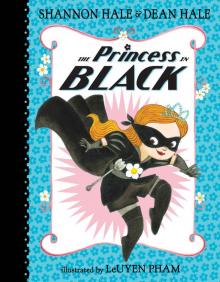 The Princess in Black
The Princess in Black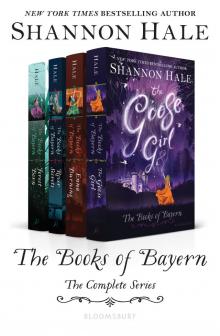 Books of Bayern Series Bundle
Books of Bayern Series Bundle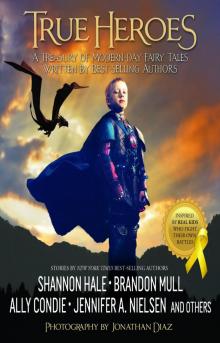 True Heroes
True Heroes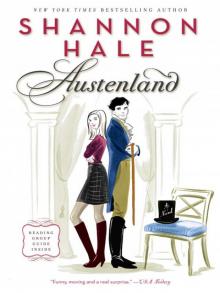 Austenland: A Novel
Austenland: A Novel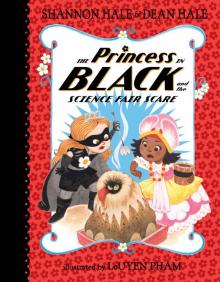 The Princess in Black and the Science Fair Scare
The Princess in Black and the Science Fair Scare![[Bayern 02] - Enna Burning Read online](http://i1.bookreadfree.com/i1/04/02/bayern_02_-_enna_burning_preview.jpg) [Bayern 02] - Enna Burning
[Bayern 02] - Enna Burning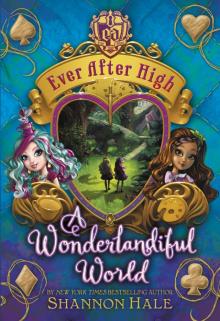 Ever After High
Ever After High Monster High/Ever After High--The Legend of Shadow High
Monster High/Ever After High--The Legend of Shadow High